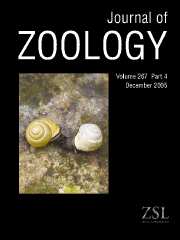Article contents
Greek and the phylum Porifera: a living language for living organisms
Published online by Cambridge University Press: 13 October 2005
Abstract
This paper gives a detailed analysis of Greek language elements in sponge terminology and nomenclature, thus contributing to its comprehension by the scientists working on sponge biology and enlightening the extensive contribution of the Greek language to zoological terminology. The contemporary terminology of sponge morphology and the taxa names of the three living classes of the phylum Porifera, down to the genus level, were recorded and examined for their possible Greek origin. The analysis of the recorded material showed that 67% of the morphological terms and 78% of the taxa names were formed from Greek elements. Different patterns of term and name formation were revealed. Detailed etymological analysis is presented for all morphological terms and suprageneric taxa names built of Greek elements. The Greek words used for the formation of terms and names are listed and their English translation is given. More than 70% of the Greek words found were used only once to form terms or taxa names. The contribution of the Greek element in sponge nomenclature in all decades from 1759 up to the present was >65%, with a slightly decreasing trend during the last two decades.
- Type
- Research Article
- Information
- Copyright
- 2005 The Zoological Society of London
- 7
- Cited by


